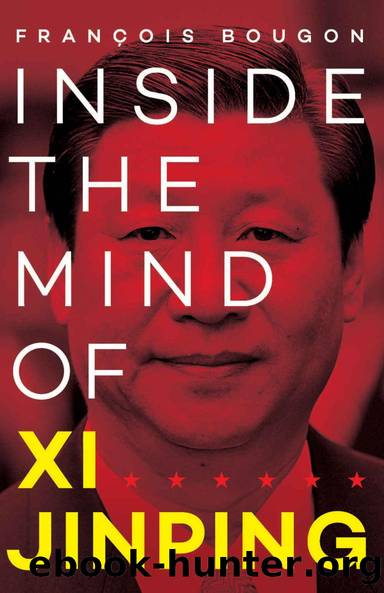Inside the Mind of Xi Jinping by Francois Bougon

Author:Francois Bougon [Bougon, Francois]
Language: eng
Format: epub
ISBN: 9789387578760
Publisher: Westland
Published: 2018-10-16T22:00:00+00:00
6
BACK TO THE CLASSICS
Xi Jinping likes to write and show off the extent of his literary knowledge. Since starting out in the Party bureaucracy in the 1980s, he has frequently written for local newspapers, without, however, claiming to be a ârealâ writer, as Mao did. Whether prose or poetry, Xiâs works are always political. Between 2003 and 2007, he was Party secretary of the eastern, coastal province of Zhejiang, one of the wealthiest in the country. He regularly published a column under a pseudonym in the Zhejiang Daily. His pen name is Zhe Xin, its two characters meaning âwiseâ and âhappyâ; it is also a homophonic play, echoing both Zhejiang province and xinxi, meaning âjoyfulâ. The future leaderâthe âhappy philosopherâ, âthe joyous sageââhad many plans in store.
While he writes in an overblown style typical of officials educated in the Party schools, Xi has always been keen to include quotations from classical authors in his texts. Apart from Huâs prime minister Wen Jiabao (2003â13), Xi is the first Chinese leader since Mao to quote the classics with such ease. His reading of great texts since primary school appears to have had a marked effect on him. He draws stylistic inspiration from his readings; does he also find in them new ways of thinking about the world around him, of meditating on power or the deeds of men?
The first observation we can make is that he does not neglect a single school of Chinese thought. This wide-ranging borrowing is above all a sign that he finds the Marxistâ Leninist base solid enough to graft onto it the long history of âwonderful Chinese civilisationâ. In the twenty-first century, the Party has taken possession of the entire history of the countryâof â5,000 years of continuous civilisationâ. Its officials are encouraged to study this history, along with Marxist thought. âLeadership cadres must study history and culture, especially traditional Chinese culture, to enrich their wisdom and perfect their personality through study,â Xi declared on 1 March 2013, the Central Communist Party Schoolâs eightieth anniversary. âChinaâs traditional culture is both extensive and profound, and to acquire the essence of various thoughts is beneficial to the formation of a correct world view, outlook on life, and sense of valuesâ.
So what are the key sources that Xi uses, bolstered by the might of his impressive propaganda machine? One important influence has been the authors of the Warring States period of the fifth to third centuries BCE. Their status in China is equivalent to that of the Ancient Greeks in the West. While it has become less common in Europe for politicians to cite the classics, it is almost second-nature in China. These authors are the fertile soil of a literary and philosophical culture shared by the educated urban populations: the Warring States period has left a lasting mark on Chinese society. It was a period of striking intellectual fertility, characterised by its great political instability: the seven statesâQi, Chu, Han, Zhao, Wei, Yan, and Qinâwere constantly at war with each other.
Download
This site does not store any files on its server. We only index and link to content provided by other sites. Please contact the content providers to delete copyright contents if any and email us, we'll remove relevant links or contents immediately.
| Anthropology | Archaeology |
| Philosophy | Politics & Government |
| Social Sciences | Sociology |
| Women's Studies |
The Secret History by Donna Tartt(16627)
The Social Justice Warrior Handbook by Lisa De Pasquale(11489)
Thirteen Reasons Why by Jay Asher(7789)
This Is How You Lose Her by Junot Diaz(5775)
Weapons of Math Destruction by Cathy O'Neil(5038)
Zero to One by Peter Thiel(4824)
The Myth of the Strong Leader by Archie Brown(4789)
Promise Me, Dad by Joe Biden(4449)
Beartown by Fredrik Backman(4420)
Stone's Rules by Roger Stone(4417)
How Democracies Die by Steven Levitsky & Daniel Ziblatt(4399)
The Fire Next Time by James Baldwin(4343)
100 Deadly Skills by Clint Emerson(4079)
A Higher Loyalty: Truth, Lies, and Leadership by James Comey(4033)
Rise and Kill First by Ronen Bergman(4012)
The David Icke Guide to the Global Conspiracy (and how to end it) by David Icke(3883)
The Farm by Tom Rob Smith(3872)
Secrecy World by Jake Bernstein(3783)
The Doomsday Machine by Daniel Ellsberg(3732)
